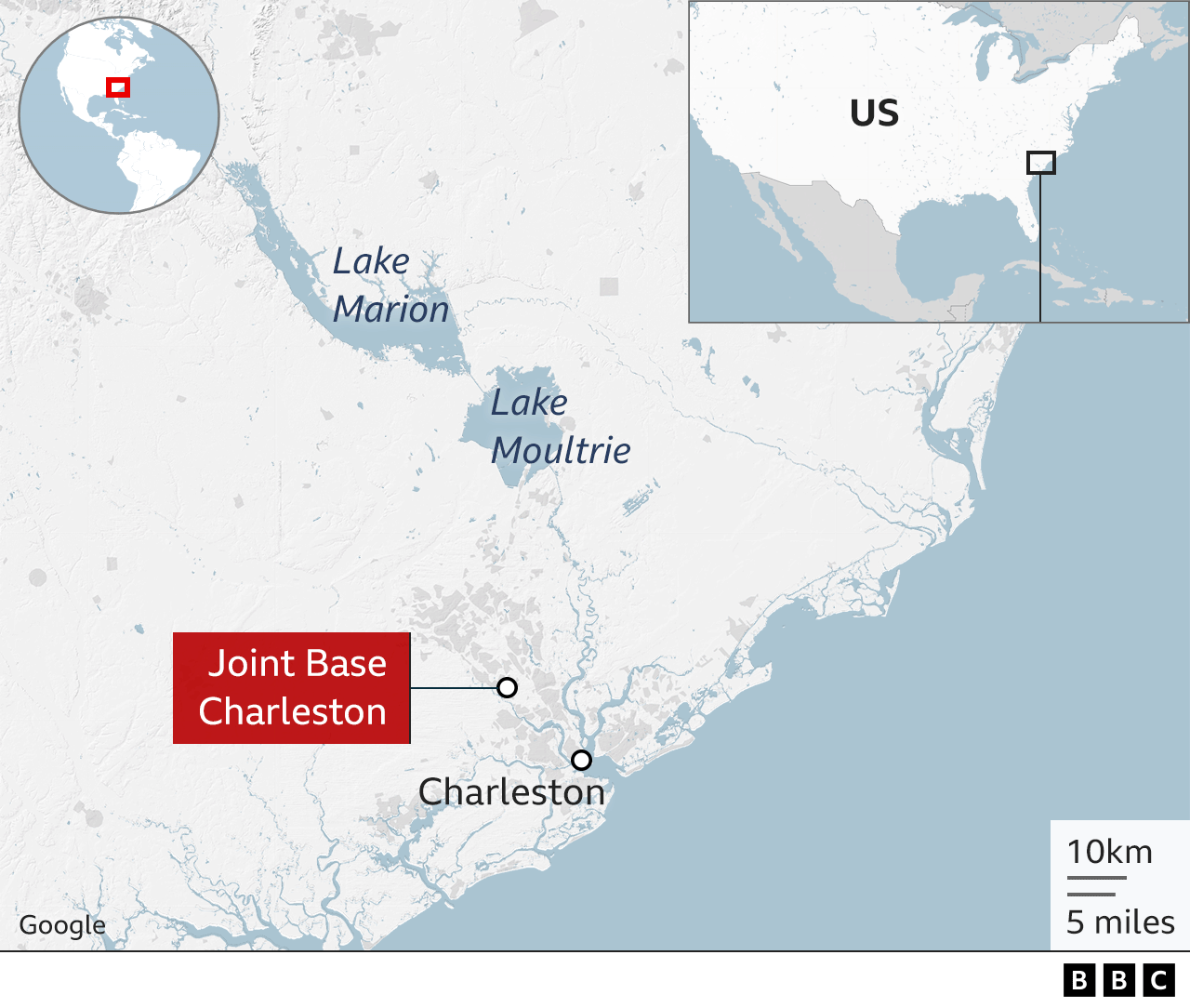Debris found from F-35 jet in South Carolina after US pilot ejected
- Published
Watch: Aerial footage shows US fighter jet debris
Military officials have found the debris of an F-35 military jet that went missing after the pilot ejected over South Carolina.
The wreckage of the $100m (£80m) plane - which disappeared on Sunday afternoon - was discovered in rural Williamsburg County, said authorities.
The pilot ejected from the cockpit and parachuted to safety in a North Charleston neighbourhood.
The public had been asked to help find the jet.
In a statement on Monday, military officials said the debris was found "two hours north-east of Joint Base Charleston".
Video shows a long narrow gash in a wooded area, where the crashed jet has downed trees as parts of the machinery broke off.
The sheriff's office for Williamsburg County said it had diverted traffic on nearby rural roads from the "extensive debris field" for an undetermined amount of time. The sheriff's office also said there were no reported injuries and a spokeswoman told the BBC that the office did not receive any calls about a possible crash or loud boom in recent days.
Officials had focused their searches around Lake Moultrie and Lake Marion, north of the city of Charleston - the jet's last known location.
The debris found has been confirmed as the wreckage of the missing plane, a military spokesperson told the BBC.
"The mishap is currently under investigation, and we are unable to provide additional details to preserve the integrity of the investigative process," the Marine Corps said on Monday after the search ended.
The public has been asked to keep away from the area to allow investigators to do their work.
Lockheed Martin, the company behind the stealth fighter plane, is supporting the government's investigation, according to a company spokeswoman.
The fighter jet was left in autopilot mode when the pilot ejected, a spokesman at Joint Base Charleston told NBC News, adding that it may have been airborne for some time, complicating its discovery.

"A plausible sequence of events is that when the pilot ejected, the electronics for the transponder were fried and thus the military was no longer able to track its location," JJ Gertler, a senior analyst at the Teal Group, a defence consultancy, told the BBC during the search for the plane.
He said it was possible the aircraft kept flying after the pilot ejected, but that it was "extremely unlikely" due to "the damage the aircraft would have received from the ejection seat" and "the change in aerodynamics when the canopy is gone".
The plane, a FB-35B Lightning II, belonged to the Marine Fighter Attack Training Squadron 501, which works to train pilots, US media reported.
The pilot that ejected was taken to hospital and was in a stable condition. A second F-35 flying at the same time returned safely to base.
Joint Base Charleston had posted on X - formerly Twitter - asking the public for help to find the aircraft.
The request led to mockery online and criticism from lawmakers.
Nancy Mace, a Republican congresswoman for South Carolina, asked on X, formerly Twitter: "How in the hell do you lose an F-35?
"How is there not a tracking device and we're asking the public to what, find a jet and turn it in?"
The aircraft is a stealth jet - meaning its airframe, sensors and systems are designed to operate undetected by enemy radar.
Watch: This is what the crashed F-35 US military jet looks like
If the plane was flying to pre-planned waypoints, its crash location may have been determined by when its fuel would run out.
The known speed and the altitude at the moment of ejection, as well as how much fuel it had left, could have made it a simple math exercise to determine its location.
Earlier on Monday, the US Marine Corps announced a two-day pause in air operations throughout the military branch this week.
A Marine Corps press release on Monday said officials plan to "discuss aviation safety matters and best practices" sometime this week.
It said the missing jet amounted to the third "Class-A mishap" in the past six weeks - a category of incident that causes more than $2.5m in damage. It did not elaborate on previous incidents.
In August, three marines died in an accident involving an Osprey tilt-rotor plane and another was killed when his jet crashed during a training exercise near San Diego.
In 2018, the US military temporarily grounded its entire fleet of F-35 jets after a crash in South Carolina.
With reporting by BBC weapons analyst Chris Partridge